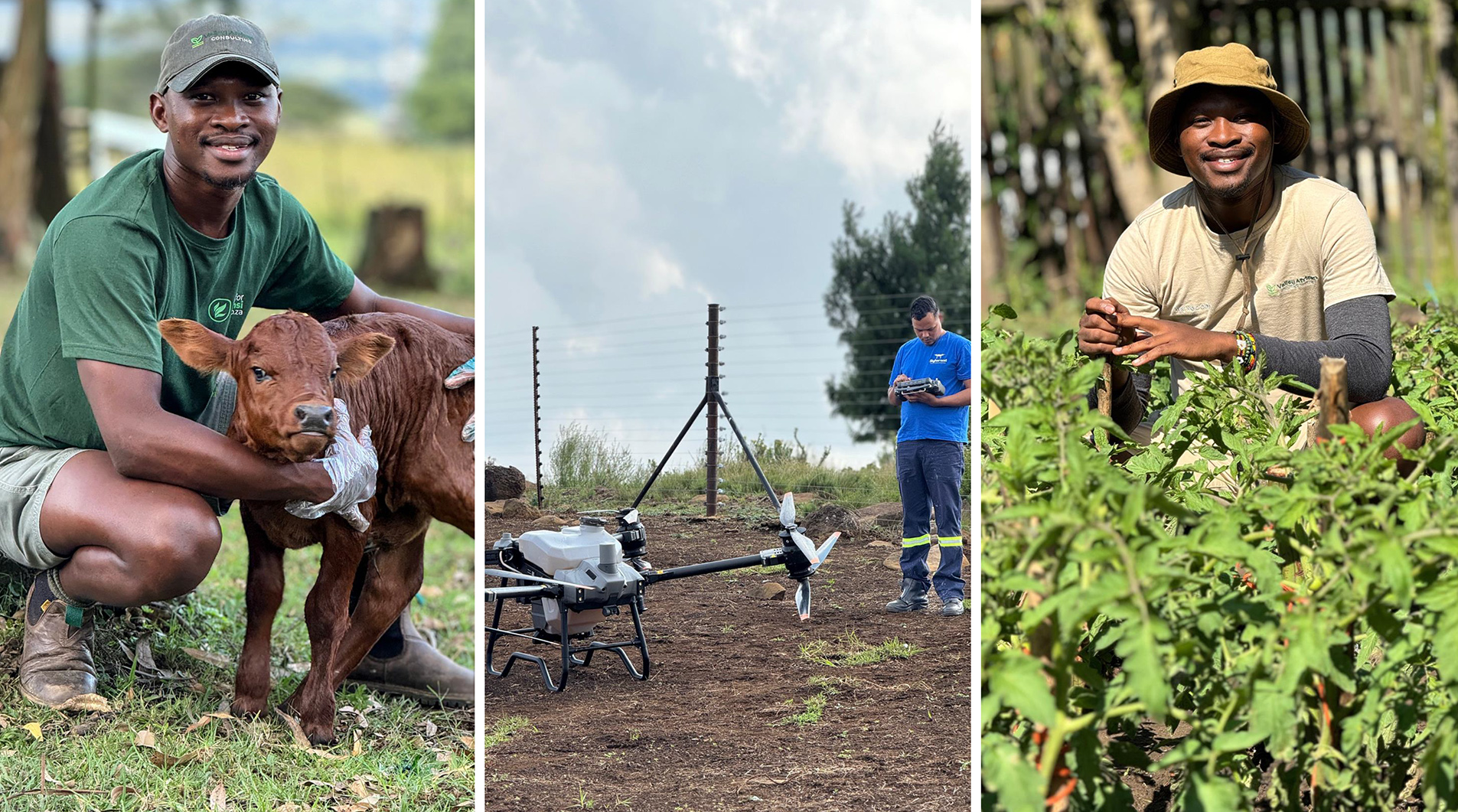In 2013, Andile Siphesihle Ngcobo enrolled at Cedara College of Agriculture in Pietermaritzburg, KwaZulu-Natal (KZN) to study farming. Six years later at the age of 25, he was managing the operations of a farm with over 100 workers. In 2024, he is venturing into innovative agrotechnologies and mentoring all over the world.
“My career has shifted from primary agriculture to processing and mentoring, I realised in my own journey that there is a gap in mentorship. Finding a mentor in farming is difficult simply just because farms are isolated, where do you go, where do you drive to because the farms are on the outskirts,” says Ngcobo.
Ngcobo, 29, says the only chance for mentoring is at agri- shows but that is also hard as the farming community can be closed off, and intimidating to try to infiltrate.
Ngcobo has a huge social media following. He says this has encouraged young and older people who want to be farmers, or agriculture students who need mentorship and internships. Even people who are already in the business would reach out asking about certain parts of the business, which led to Ngcobo establishing a consulting business that now hires over eight people.
“I asked myself if I was even qualified to mentor despite my experience but the mentorship space has its own requirements. So I got in touch with Agriseta, registered my company with the natural sciences council and all the necessary preparations to become a fully-fledged consulting firm,” says Ngcobo.
Ngcobo now helps with agri-business strategies. One of his favourite clients is a group of women in a rural community on the outskirts of Pietermaritzburg. With Ngcobo’s help, the women expanded from planting 500 cabbages in their backyards to 5,000 and now access the market as a collective with Ngcobo’s guidance on how to commercialize and grow their yields.
“They were scared at first but they have done so well, I haven’t had to encourage them, after three first seed donations they gave the produce, I sell, bring back more seeds,” says Ngcobo.
Spreading the good word
Ngcobo says the agricultural industry has a diverse range of skills needed but most people think of farming only, as he did when he went into the industry.
“People don’t know the value chain of food from the farm to the table, so I believe the opportunity is in the accompanying sectors as well, such as quality assurance, logistics, storing,” says Ngcobo.
Ngcobo has been to multiple countries including France where he stayed for three weeks training students on planting, soil preparation, legumes and tractor mechanics, in partnership with the University of KwaZulu-Natal. He has also trained people in Lesotho and Namibia and will return for further mentoring soon. However, the bulk of his consulting is in Pietermaritzburg.
When asked about the challenge of being a young farmer and consultant, Ngcobo was reluctant to share saying he is not one to dwell on challenges. He did say that getting funding is difficult, due to the amount of red tape and hoops younger and small to medium business owners face. The owner of the farm Ngcobo managed, Dedani Mkhize, who is the son of former minister of health Zweli Mkhize, was embroiled in an investigation when the Department of Health communications contractor Digital Vibes purchased a second-hand bakkie for him.
Ngcobo says “I have had my fair share of fails and in agriculture, if your yields have not performed well or hail knocks fields off, you are done for that year. You will have to try again next year,” Ngcobo says.
Such make-or-break challenges have contributed to Ngcobo’s grit and innovative mentality — always looking for the next solution and opportunity.
Drone technology
Ngcobo co-founded Sky Harvest with his friends, which aims to provide technology such as drones to farmers. They have acquired 40 agriculture drones that can help farmers with precision agriculture; spraying, sowing and plant protection. The drones have high-tech cameras and devices that monitor disease, pest, irrigation and fertiliser conditions.
Ngcobo is passionate as he explains the benefits. He feels it’s vital for farmers to move towards using innovative technology in farming but says he has had some convincing colleagues. Many in the industry believe in the traditional methods that have worked for them.
The technology is expensive but Ngcobo is adamant it can save hundreds of thousands to millions of rands in the long run.
“Right now we use tractors and have a container at the back that sprays but that can be challenging if you planted maize, for example, because it can’t get in between — it’s too big. The bigger companies can afford interventions that cost even R2-million or beyond. Some have to use helicopters to spray the crops, to ripen cane for example,” says Ngcobo.
Ngcobo stresses he is by no means saying all tractors should be scrapped, as he also is invested in mechanisation, but he is happy to prove the efficiency of this technology when businesses need it for any reason.
Artificial intelligence, robotics and other technology are shifting the agricultural industry, bringing about conversations about new practices such as precision farming and regenerative agriculture which are proposed to be better for the environment and human consumption.
Ngcobo’s star seems to keep rising despite the tough economic and environmental climate challenges. He jokingly likens being an agro-entrepreneur to a board game saying, “I was speaking to my friends saying sometimes it feels like we are living in a snakes and ladders game; you can go many steps forward then before you know, snake, you are few steps back,” Ngcobo says. DM





